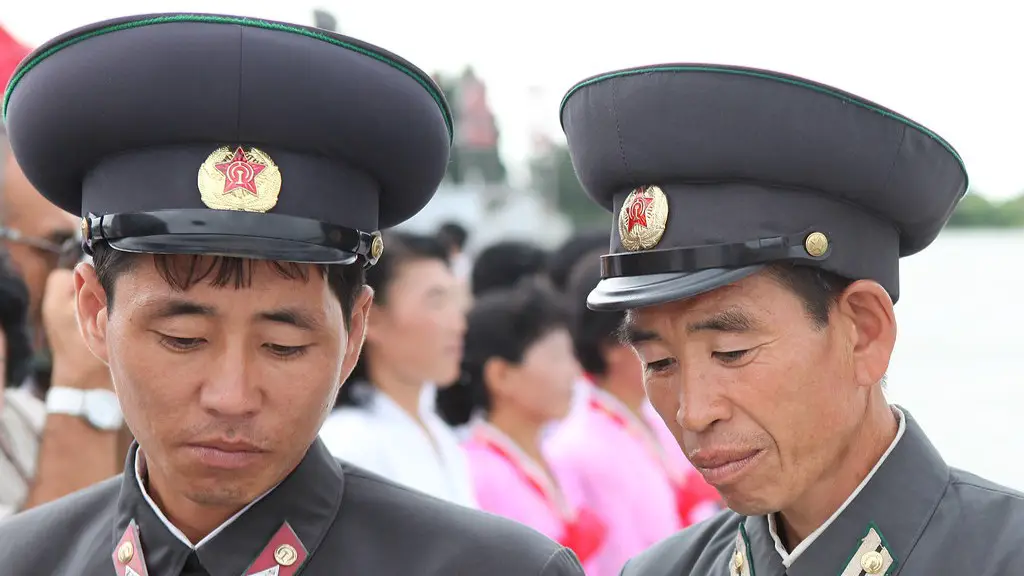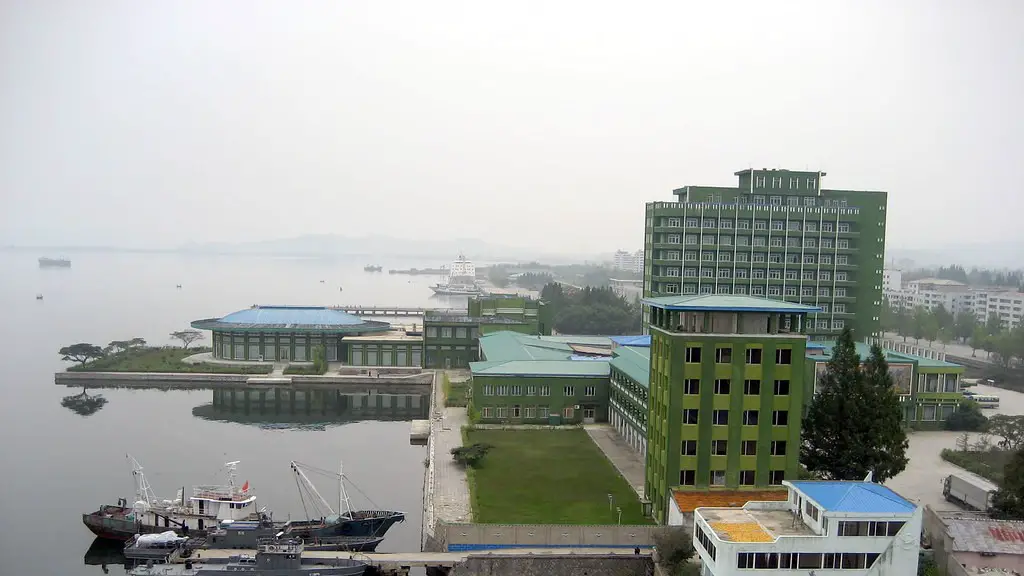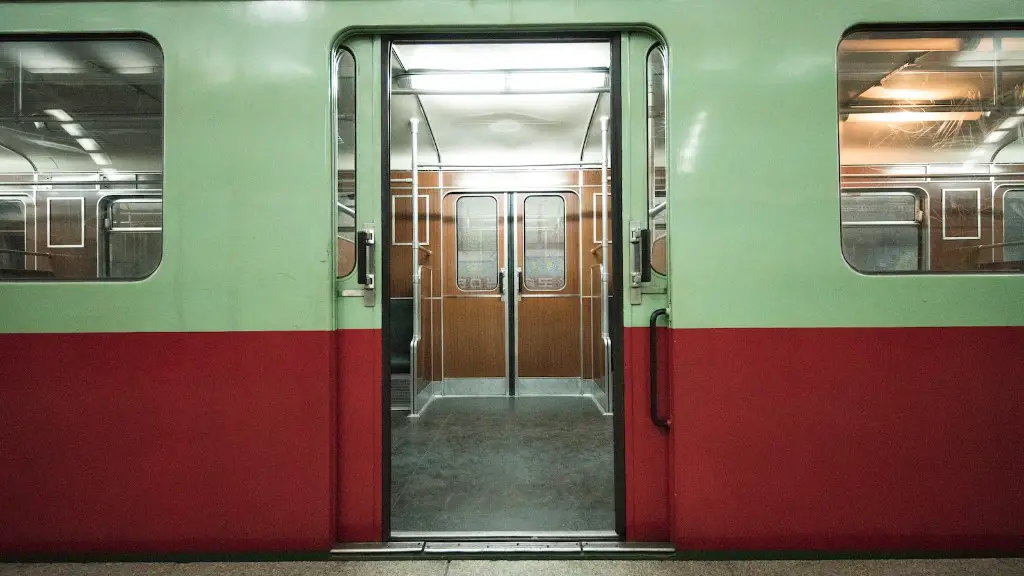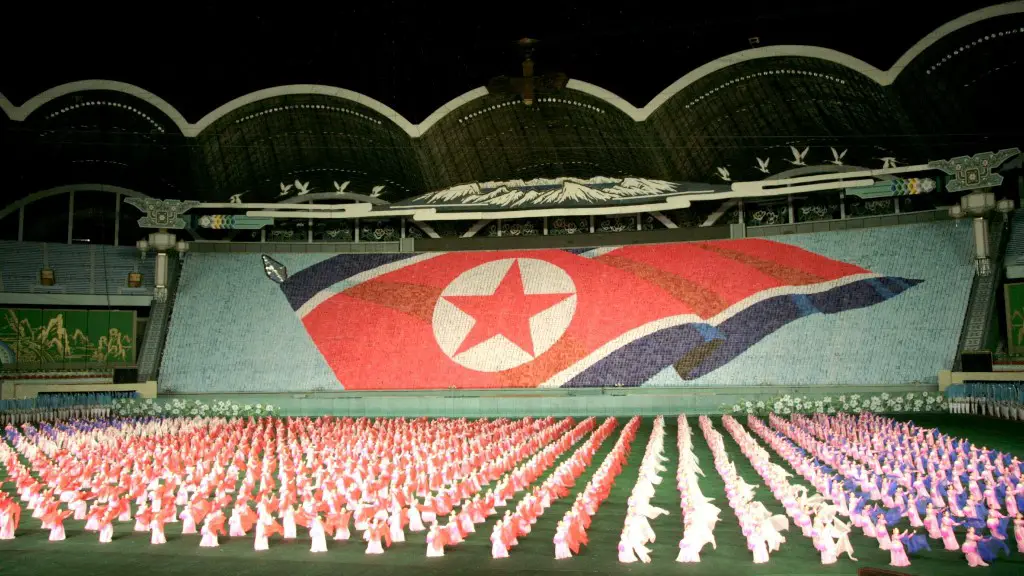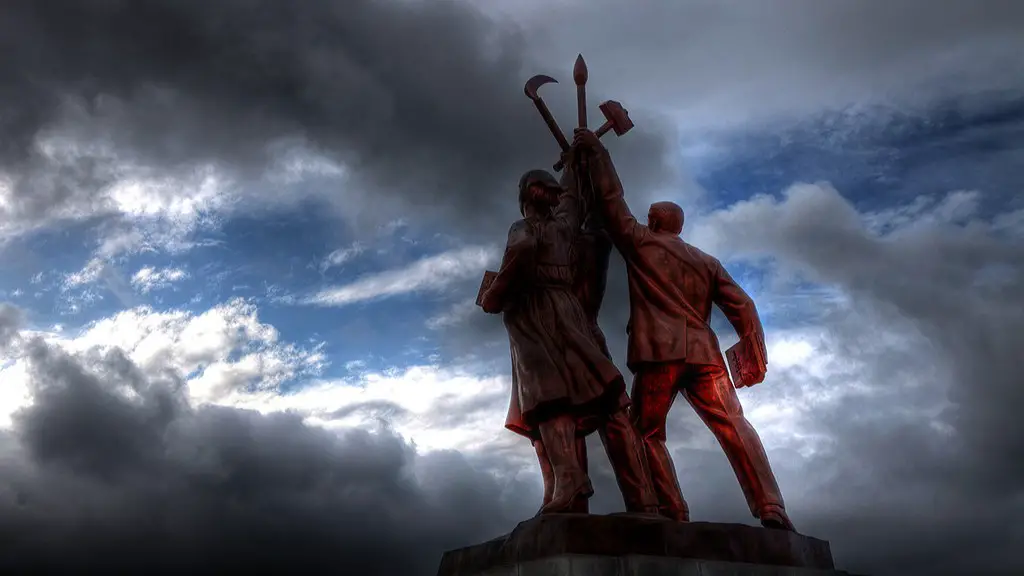North Korea as a Dictatorship
The Democratic People’s Republic of Korea (DPRK, or North Korea) is a dictatorial state led by one of the world’s most oppressive governments. Under the rule of the Kim family, which has ruled the country since it was founded in 1948, the governments of the DPRK have adopted a policy of extreme isolationism, clamping down on the exchange of ideas and information between North Korea and the outside world. This policy has resulted in a nation that is both secretive and oppressive, where basic human rights are not respected and political power is concentrated in the hands of a few.
The government of the DPRK operates on “Juche”, an ideology based on self-reliance. This policy means that the DPRK concentrates its efforts on ensuring that the state-controlled media is tightly controlled, and ultimately reports to the ruling Kim family. This means that any criticism of the Kim family or the government itself is harshly suppressed. In addition, North Korea relies heavily on the public adoration of the Kim family, leading to the regular public adoration of Kim Jong-Un (the current leader) and other family members.
North Korea has been repeatedly criticised by the international community for its human rights abuses, including the reported use of torture, mass imprisonment and execution of political prisoners, and for suppressing freedom of expression and association. The country has also been criticised for its nuclear weapons program, which has been described as a threat to regional and global stability. Although there appears to be some progress in terms of the economic situation in North Korea, it is difficult to assess how much of this progress is the result of genuine reform or just another way to increase the government’s control.
As with any dictatorship, the North Korean regime relies heavily on propaganda to maintain its position of power. The state-controlled media is used to glorify the Kim family and to spread misinformation and disinformation. This propaganda is spread through newspapers and TV broadcasts and also through the state-controlled internet. The media is also used to influence public opinion, by portraying North Korea as a powerful nation and a safe haven from the dangers of the outside world.
The North Korean government also enforces strict laws and regulations to maintain its grip on power. This includes a complete ban on foreign media and social media, and very tight restrictions on travel. North Korea also enforces strict surveillance on its citizens, to ensure that any dissent is quickly stamped out. In addition, the state security apparatus is used to ensure that any dissent is quickly dealt with.
The North Korean government has been described as one of the world’s most repressive and secretive regimes, and it is clear that it is not a democracy. However, the Kim family’s grip on power is absolute, and any changes to the system of governance are unlikely to be forthcoming in the near future.
Oppression and Propaganda
The oppressive and controlling nature of the North Korean government is underpinned by the use of widespread propaganda. Propaganda is used to portray North Korea as a powerful and independent nation, and to glorify the Kim family and their rule. This means that the North Korean population are kept in the dark about events outside their own country, and any criticisms of the government are quickly suppressed.
The state-controlled media is an integral component of the North Korean government’s propaganda machine. It is used to ensure that information and images presented to the public conform to the government’s narrative. This means that the media is heavily censored – news reports are often biased, and even the most mundane items are subject to censorship.
In addition, North Korea also utilises more subtle propaganda techniques, such as the indoctrination of its citizens from an early age. Children in North Korea are taught to venerate the Kim family and the ruling party, and are raised to believe that the Kim family are the only ones capable of protecting their country from outside forces. As a result, they are psychologically unable to consider alternative forms of government.
Furthermore, North Korea is said to use ‘cultural revolution’ techniques – such as organized rallies and public ceremonies – to create passionate devotion to the ruling regime. This includes mass expressions of support for the leadership, and is often enforced by military and security personnel.
The North Korean government is also known to use extreme measures to suppress dissent. Political prisoners are routinely arrested and sent to labour camps, where they are subject to torture and even execution. International observers have also reported the use of ‘human guinea pigs’ – political prisoners who are subjected to medical experiments or labour in horrendous conditions.
Repression of Religious Activity
The State Security Department, the Ministry of People’s Security and the police in North Korea are all tasked with maintaining the rigid political system in the country. They do so by the use of surveillance and repression of religious activity, which is seen as a threat to the North Korean government’s ideology of Juche, or self-reliance. North Korean Christians, in particular, have reported suffering from extreme restrictions and forms of punishment for their activities.
There are also reports of North Korean citizens being treated differently based on their political views. North Korean authorities reportedly target those who show any sign of dissent or criticism for the North Korean leadership. Those suspected of holding the ‘wrong’ views are subject to interrogation, and may even be sent to prison camps, where they are subjected to harsh physical and psychological torture.
The government of North Korea also enforces strict censorship, and restricts information by forbidding access to foreign media and social networking websites. This means that citizens are unable to access accurate information, and instead are only exposed to the narrative of the state-controlled media.
In addition, North Korea is known to restrict access to religious activity by enforcing strict regulations on those wishing to travel abroad. This means that North Korean Christians are unable to attend churches abroad and hence are unable to interact with other believers or access information and resources.
Furthermore, North Korea also seeks to prevent organised religious activities within the country, by targeting religious groups and imprisoning those involved in religious activities. North Korean authorities have been known to target Christian house churches, which are seen as a threat to the North Korean ideology of Juche.
International Criticism
The North Korean government has been the target of widespread criticism from the international community for its oppressive regime and human rights abuses. The United Nations Commission of Inquiry (COI) on Human Rights in North Korea has documented numerous violations, including torture, public executions and the trafficking of women and children.
North Korea has also been criticised by international observers for its lack of transparency, and for its lack of progress in terms of economic and political reform. The COI has concluded that the oppressive nature of the North Korean regime has resulted in poverty, mental illness and long-term health problems.
The international community has also called on the North Korean authorities to end the suppression of freedom of expression and association, and to respect the right of its citizens to freedom of thought, conscience and religion. However, the North Korean government has consistently rejected these calls, and continues to suppress any form of dissent.
In addition, North Korea is said to have one of the world’s most repressive Internet policies, controlling access to the internet and blocking access to foreign websites. North Korea is also reported to have used hackers to spy and conduct cyber-attacks against foreign countries. These activities have been widely condemned by the international community, but the North Korean government has denied any involvement.
The North Korean authorities have also been criticised by the international community for the policies of its nuclear weapons program, which is seen as a direct threat to regional and global security. The international community has repeatedly called on the North Korean government to cease its weapons program and to return to the negotiating table. However, the North Korean government has consistently refused to compromise and has instead continued to bolster its nuclear weapons program.
Economic Woes
The North Korean government is facing significant economic challenges, including slow economic growth and chronic shortages of basic goods. These economic problems have been exacerbated by the North Korean government’s decision to introduce a new economic policy in 2011, known as ‘byungjin’. This policy has resulted in rising debt levels, as well as falling wages and a dramatic fall in the value of the North Korean won.
The economic woes have been further exacerbated by the international sanctions imposed on North Korea. These sanctions have targeted North Korea’s nuclear weapons program, its exports and its access to foreign currencies. These sanctions have further hampered the North Korean economy, as they have resulted in a loss of investment, export earnings and access to resources.
The North Korean government has attempted to tackle its economic problems by encouraging foreign investment and by reforming its economy. In spite of these efforts, it is clear that the North Korean economy is still a long way from being able to support its own citizens. This can be seen in the fact that North Korea is currently among the poorest countries in the world, with high levels of malnutrition, poverty and unemployment.
Furthermore, North Korea is the only nation in the world that still adheres to a planned economy. This has resulted in a rigid and inefficient economic system, which is further hampered by centralised decision making and a lack of competition. As a result, North Korea has been unable to develop its economy in a more efficient manner, and its citizens have had to bear the brunt of the economic downturn.
The crumbling state of the North Korean economy has forced many citizens to find ways to survive outside of the official system. This has led to an increase in black-market activity, as citizens seek to find cheaper goods, services or goods to sell. This lucrative activity has been fiercely suppressed by the North Korean authorities, yet it is estimated that nearly 10% of the country’s GDP is generated through illegal activity.
Humanitarian Crisis
The oppressive nature of the North Korean government, coupled with the country’s deteriorating economic situation, has resulted in a humanitarian crisis. This can be seen in the widespread malnutrition and hunger in North Korea, as well as in the dire situation of those affected by extreme poverty.
The North Korean government has come under heavy international criticism for its unwillingness to accept outside aid. This has resulted in an increase in the suffering of North Korean citizens, who have little or no access to basic goods, clean water or medical care.
Furthermore, North Korea is known to have one of the highest rates of infant mortality in the world, and its population is said to be suffering from serious health problems due to the country’s lack of access to medical supplies and technology. In addition, reports of human rights abuses continue to surface, including torture and the suppression of dissent.
The dire situation of North Korean citizens is further compounded by the country’s extreme isolationism. This means that North Koreans are unable to escape the grip of the North Korean authorities, and are reliant on them for food and other resources.
The international community has continued to call on the North Korean government to accept outside aid, yet this has not been forthcoming. Instead, the

